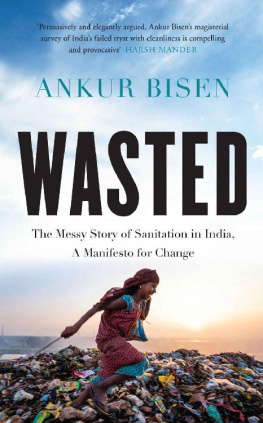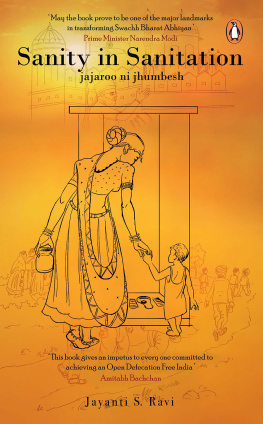Ankur Bisen - Wasted: The Messy Story of Sanitation in India, A Manifesto for Change
Here you can read online Ankur Bisen - Wasted: The Messy Story of Sanitation in India, A Manifesto for Change full text of the book (entire story) in english for free. Download pdf and epub, get meaning, cover and reviews about this ebook. year: 2019, publisher: Pan Macmillan, genre: Politics. Description of the work, (preface) as well as reviews are available. Best literature library LitArk.com created for fans of good reading and offers a wide selection of genres:
Romance novel
Science fiction
Adventure
Detective
Science
History
Home and family
Prose
Art
Politics
Computer
Non-fiction
Religion
Business
Children
Humor
Choose a favorite category and find really read worthwhile books. Enjoy immersion in the world of imagination, feel the emotions of the characters or learn something new for yourself, make an fascinating discovery.
- Book:Wasted: The Messy Story of Sanitation in India, A Manifesto for Change
- Author:
- Publisher:Pan Macmillan
- Genre:
- Year:2019
- Rating:5 / 5
- Favourites:Add to favourites
- Your mark:
- 100
- 1
- 2
- 3
- 4
- 5
Wasted: The Messy Story of Sanitation in India, A Manifesto for Change: summary, description and annotation
We offer to read an annotation, description, summary or preface (depends on what the author of the book "Wasted: The Messy Story of Sanitation in India, A Manifesto for Change" wrote himself). If you haven't found the necessary information about the book — write in the comments, we will try to find it.
Ankur Bisen: author's other books
Who wrote Wasted: The Messy Story of Sanitation in India, A Manifesto for Change? Find out the surname, the name of the author of the book and a list of all author's works by series.
Wasted: The Messy Story of Sanitation in India, A Manifesto for Change — read online for free the complete book (whole text) full work
Below is the text of the book, divided by pages. System saving the place of the last page read, allows you to conveniently read the book "Wasted: The Messy Story of Sanitation in India, A Manifesto for Change" online for free, without having to search again every time where you left off. Put a bookmark, and you can go to the page where you finished reading at any time.
Font size:
Interval:
Bookmark:

I n 2017, two unrelated events, 7,000 kilometers apart, occurred revealing the chasm between the stance of two societies on a common issue sanitation.
The Thames Water Plc., a public limited entity and the biggest water utility company in the UK, supplies water to nearly 15 million homes in London and in the Thames Valley region. In 2017, it was slapped with a penalty of GBP 20 million (200 crores) for allowing its operations to dump 1.4 billion liters of raw sewage into the River Thames in 201314. Thames Water admitted this gross misconduct after the prosecuting court found evidence that proved the offense beyond doubt. Since 2014, the UK has revised its sentencing and penalty guidelines for environmental offenses and has made them more severe than they had ever been in the past. This sealed the fate of Thames Water Plc.
Meanwhile, in India, the National Green Tribunal (NGT), the Indian judicial system formed in 2010 to expedite litigation matters that concern environmental protection, issued a verdict against four governance entities in 2017 Uttar Pradesh State Pollution Control Board, Mathura Cantonment Board, District Magistrate Mathura, and Central Pollution Control Board: the matter being waste disposal at a garbage landfill site in the city of Mathura, which threatened to contaminate the river Yamuna due to its design and proximity. The verdict could only impose a penalty to the tune of 15 lakhs (GBP 20,000) for a sheer lack of specific rules and guidelines about waste disposal in landfills. Ironically, the verdict also directed these bodies to formulate proper rules for such waste disposal.
These two judicial interventions seemingly address the same issue, but bring out diametrically different approach by two different societies. In the UK case, the judicial order was a precise and severe judgment that clearly established the offense of a private entity found in breach of the law. The penalty imposed also reveals the countrys clarity of jurisprudence regarding waste management. However, in India, the judicial verdict appears to be but an exasperated response that cries out of helplessness for the lack of laws on the issue. In common wisdom, the material evidence presented during the trial of the case suggests impropriety regarding waste disposal undertaken by the authorities. But, the verdict could not explicitly establish the guilt of the parties, and, on the contrary, was a pronouncement of the guilt of state actors a mere rap on their knuckles for inadequate legislation on waste disposal: the meager fine further highlights the frustration of the powerless judiciary to corner the executive and define proper and improper acts.
At present, India ranks among the top ten waste generators in the world, and is projected to be among the top four in the coming decade. At this stage, the judiciary pleading with the executive to accelerate legislation on the issue of waste management is catastrophic, while the states lethargy to not pass a law on this issue is baffling. The arguments presented by the state actors in their defense during the trial of the Mathura landfill case hints at two reasons that explain their attitude.
The first is the governments sheer ignorance on the issue of waste disposal. The concerned bodies cited common dumping of biodegradable and non-biodegradable garbage, use of open landfills, and relying on ragpickers as acceptable methods of disposal, practices that have been banned in the First-World countries for decades now. The second reason is the pretense of the governance bodies, to knowingly accept non-conformity to the rule, arguing for lack of funds to take suitable action and passing the buck among each other.
It can be said that the Mathura landfill disposal case captures the Indian societys challenge on the issue in its entirety. It has taken seventy years since Independence for our prime minister to address the stinking issue of the countrys garbage problem.
The silent acquiescence of the Indian society on toxic rivers that are unfit for any purpose, of simmering landfills that hold a towering presence in cities, of stinking littered garbage in neighborhoods, of choked sewers, contaminated soil, and polluted air, and of squalid hell holes that pack one quarter of urban Indians raises a pertinent question about the societys behavior on the issue of sanitation: Is this pretense or ignorance? Evidently, this surrender qualifies as an act of pretense. Why else would the prime minister acknowledge that India is dirty and needs to be cleaned? What are the reasons that compelled the Indian society to look the other way on the issue? The reasons are so illusive that they bring about a sense of helplessness to accept the status quo.
If we are to reject the pretense theory then the prime ministers speech is an acknowledgement of Indias stance on the issue of sanitation as ignorance. It is also an acceptance that neither Indias present generation nor its previous generations ever lived in a clean society. This pushes the issue of sanitation into the realm of philosophy: if a society has never experienced a desirable state of cleanliness then the entire notion becomes relative. My idea of hygiene may not pass your cleanliness standards, but I give two hoots to your standards. Perhaps I am fine with the toxic river because I have never seen it in any other color during my adult life. I am fine with the simmering landfill because I have spent my entire childhood absorbing its visuals and inhaling its presence. I am fine with littered garbage and choked sewers around my house because I am not aware of an alternate existence. It may baffle people who were raised in clean surroundings, but I do not know what clean means. If the Indian society is ignorant about the very notion of cleanliness then these are defendable arguments. But these arguments also raise other questions on human instincts and race.
Do humans have the instinct to appreciate a clean environment? How do they respond to dirty surrounding? How is this response similar to, or different from, that of threat on life or hunger or love? Literature offers some interesting points to ponder. Perfume: The Story of a Murderer, a literary classic written by the German writer Patrick Sskind in 1985, is an allegory for the human instinct of smell. Set in eighteenth-century France, a time when garbage and sanitation in the country were unresolved matters, the protagonist is an orphan whose mother, a poor young woman, brings him into the world on a pile of abject filth in the hope that he will not survive, as did all her previous stillborn children. But, miraculously, Jean-Baptiste Grenouille survives and grows up to possess an exceptional sense of smell. In his pursuit of superior fragrances, he becomes a perfumer, and when he becomes aware of the wondrous scent of the human body, he turns a murderer. When tried of the many killings, he hypnotizes the townsfolk by unleashing a soothing new scent, a welcome relief from the perpetual stink of their everyday surroundings. Perhaps the reason why Grenouille becomes a pursuer of good smells is to overcome the surrounding circumstances at the time of his birth.
People appreciate good smells and reject bad ones. Till the pre-industrialized period, the struggle with sanitation was largely driven by the pursuit of removing odor from the society. Are human species not the same across countries? Are Indians as a race different to interpret garbage than others? Then why does India continue to struggle with rubbish while many other countries sparkle?
Indian society displays remarkably contrasting evidence that makes it difficult to conclude whether its challenges on sanitation stem from an act of pretense or from an act of ignorance. Why are many Indian homes spotlessly clean, but the surroundings disgustingly dirty? Why are homemakers dogmatic about kitchen hygiene, but do not mind tossing waste from the windows on to the streets? Why are some automobile owners on a short fuse if their vehicles get dirty, but unabashedly throw litter on the street while driving? Why do we celebrate festivals with rituals that involve cleaning of homes? Why are cantonment or VIP areas a picture of cleanliness and other areas of the same city a mess? Why do people not mind searching for god at places of worship that are perpetually surrounded by a sanitation hell? India, till now, has consistently used a sweeping stroke to seek solutions for its sanitation problems. Garbage is found littered on streets because there are hardly any bins. Why then are the streets equipped with an adequate number of garbage bins still strewn with garbage? To make a difference, India first needs to reconcile such contradictions, and see where it stands in the world order on sanitation vis--vis other developing and developed nations.
Font size:
Interval:
Bookmark:
Similar books «Wasted: The Messy Story of Sanitation in India, A Manifesto for Change»
Look at similar books to Wasted: The Messy Story of Sanitation in India, A Manifesto for Change. We have selected literature similar in name and meaning in the hope of providing readers with more options to find new, interesting, not yet read works.
Discussion, reviews of the book Wasted: The Messy Story of Sanitation in India, A Manifesto for Change and just readers' own opinions. Leave your comments, write what you think about the work, its meaning or the main characters. Specify what exactly you liked and what you didn't like, and why you think so.









